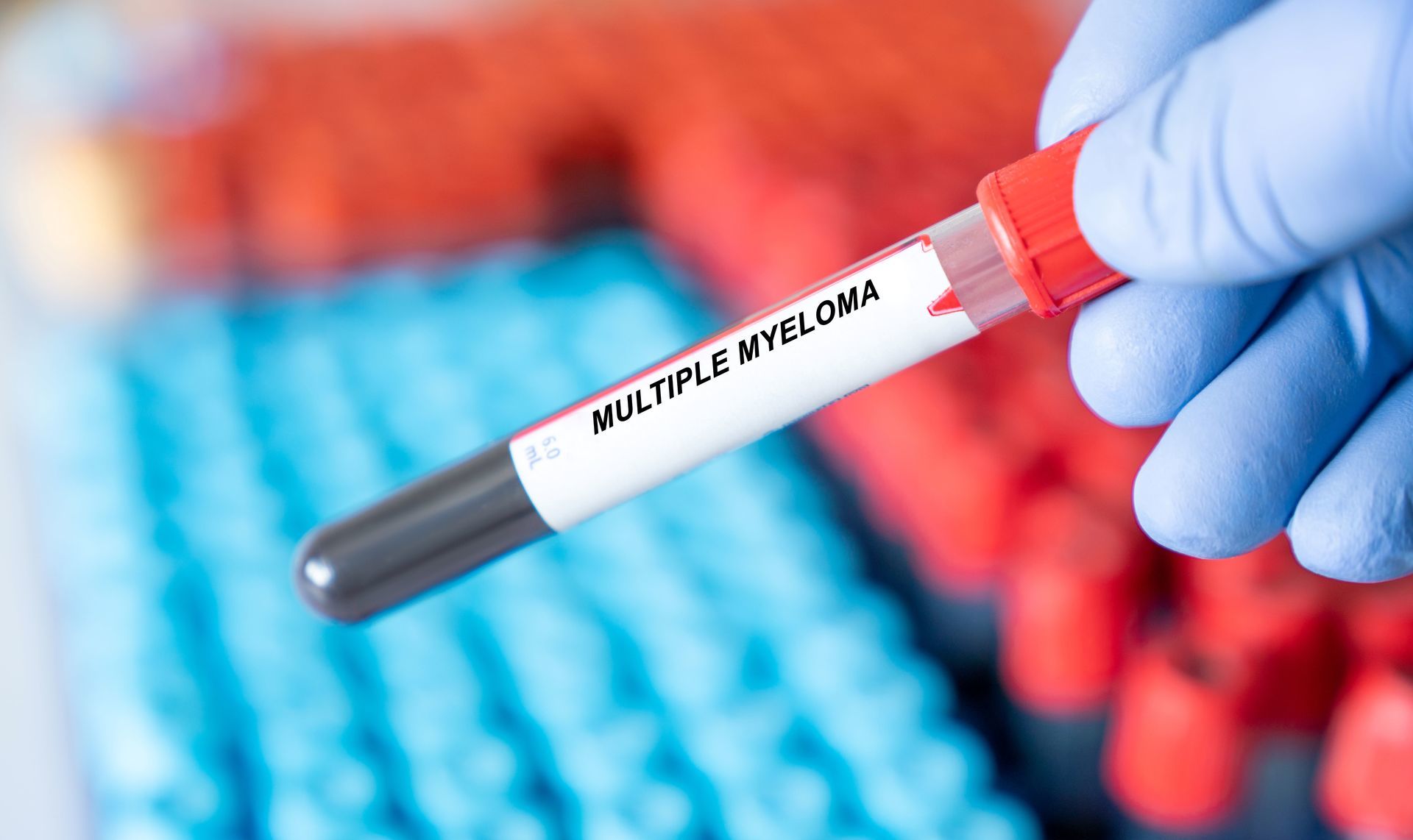What is Blood Cancer: The Five Distinct Disease Types
Posted on 19th September 2023 at 12:06
September is Blood Cancer Awareness Month, every September Blood Cancer UK, a community dedicated to beating blood cancer by funding research, raising awareness, and supporting people and families affected by it, raise awareness. Using events and social media campaigns to get people talking and raise the profile of blood cancer in the public, media, and government. This year the campaign is to get the community together to #SayBloodCancer, and we thought we would get involved to raise awareness and get our own community talking.
Blood Cancer
Blood is made up of different cell types, including red blood cells which carry oxygen around the body, platelets to help the blood clot and white blood cells that fight infections. Blood cancer is a type of cancer that affects these blood cells, causing mutations in the DNA within them, this causes the blood cells to start behaving abnormally.
Over 40,000 people are diagnosed with a blood cancer each year in the UK, and over 250,00 people are currently living with blood cancer. The most common types of blood cancer are Leukaemia, Lymphoma and Myeloma, whilst there are also types called Myeloproliferative Neoplasms (MPN) and Myelodysplastic Syndromes (MDS).
Types of blood cancer
Leukaemia
Leukaemia is a type of blood cancer that affects blood cells in your bone marrow- typically white blood cells. Bone marrow is the soft, fatty tissue found inside your bones, bone marrow contains cells that produce blood cells and platelets, it is responsible for creating billions of new blood cells each day. With leukaemia, blood cells are not produced the way they should be, producing too many, too few, or blood cells that don’t work properly.
There are different types of leukaemia depending on the type of blood cell affected and how the condition develops. Some are slow growing, known as chronic conditions and some are fast growing, known as acute conditions. Follow the links for more information on these types of leukaemia:
Lymphoma
Lymphoma is a type of blood cancer that affects white blood cells called lymphocytes. A lymphocyte is a type of white blood cell that is part of the immune system, there are two main types of lymphocytes: B cells and T cells. The B cells produce antibodies that are used to attack invading bacteria, viruses, and toxins. The T cells destroy the body’s own cells that have themselves been taken over by viruses or become cancerous.
With lymphoma, something goes wrong with the development of your lymphocytes, they don’t work properly and can multiply out of control. There are two main types of lymphoma- Hodgkin lymphoma and non-Hodgkin lymphoma. Over 14,000 people a year are diagnosed with one of the types of lymphoma, making it the most common type of blood cancer.
Learn more about the two types of lymphoma by following the links below:

Myeloma
Myeloma, also known as multiple myeloma, affects white blood cells called plasma cells. It’s called multiple myeloma as the cancer often affects several areas of the body, such as the spine, skull, pelvis, and ribs.
Usually, plasma cells make antibodies that help you fight off infections, with myeloma your plasma cells start to make antibodies which don’t work properly, they also grow quicker than they should. It is possible to be diagnosed with smouldering myeloma, where you don’t have any symptoms and may not need treatment for some time, sometimes never. Myeloma is more common amongst men, typically those over the age of 70.
Myeloproliferative Neoplasms (MPN)
Myeloproliferative Neoplasms (MPN) are a group of rare conditions that affect the blood, MPN is where your bone marrow produces too many of a particular type of blood cell. The type of MPN you have will depend on the type of blood cell your body is making too many of. There are three main types of MPN:
Polycythaemia Vera (PV)
Essential Thrombocythemia (ET)
Myelofibrosis (MF)
The World Health Organisation (WHO) classes all MPN’s as blood cancers because the bone marrow is producing blood cells in an uncontrollable way, however many people with MPN tend to feel well and the condition doesn’t interfere too much with everyday life, they may only need gentle treatment as the disorders typically progress slowly with periods of stability. Around 4.180 cases of MPN are diagnosed each year in the UK.


Myelodysplastic Syndromes (MDS)
Myelodysplastic Syndromes (MDS) are a group of conditions where your bone marrow does not work correctly and produces faulty blood cells. When everything is working normally, your bone marrow makes healthy blood cells, and the right number of each type gets released into your bloodstream, with MDS this process has gone wrong. The result is that the number of one or more types of healthy blood cells in your blood is reduced, instead producing abnormal cells. There are three main types of MDS:
MDS with single lineage dysplasia- where you don’t have enough blood cells
MDS with multilineage dysplasia- where you don’t have enough red blood cells, white blood cells or platelets
MDS with excess blasts- where you don’t have enough red blood cells, white blood cells or platelets, and have a higher risk of developing acute myeloid leukaemia (AML)
As the condition develops, your bone marrow gets taken over by abnormal blood cells, which don’t work properly, they push out all the healthy blood cells, making the number that reach the bloodstream reduce. The condition can develop slowly or quickly and can also develop into a type of leukaemia called acute myeloid leukaemia (AML).
Around 2,150 people are diagnosed with MDS in the UK each year, while it can affect people of any age, it is most common in adults over the age of 70.
Symptoms of Blood Cancer
People with blood cancer may experience a wide range of different symptoms, and your symptoms will vary depending on the type of blood cancer you have. They may be mild and slow to develop or aggressive. Just because you have symptoms does not necessarily mean you have blood cancer, but it is always best to get checked out by a GP.
Weight loss
Bruising
Bleeding
Lumps or swellings
Breathlessness
Night sweats
Weakness
Infections that are persistent, recurrent, or severe
High fever
Rash or itchy skin
Pain in your bones, joints, and muscles
Fatigue
Paleness
Swollen lymph nodes
Diagnosis
If you are concerned about your health, have noticed a change in your body or have had any of the symptoms listed above, it is a good idea to make an appointment with your GP to express any of your concerns. Having these symptoms does not necessarily mean you have blood cancer, but it is always best to get checked over by a health professional, they can ease your mind, explore any other potential conditions, or send you for further tests if they have concerns.
The first thing they may do is a physical examination, they may also send you for a blood test, if they believe further testing needs to be carried out, they may refer you to the hospital for further tests. The most important thing is not to worry, whilst having cancer is a scary prospect, the chances are still low and the outcome for people is getting better and better each year, with medical and technological advances from incredible charities, doctors, and scientists all over the world.
How can we help?
Academy Care, are a domiciliary care company, providing support to individuals whom for reasons of ill health or disability, could benefit from long or short-term domiciliary care services in the comfort and familiar surroundings of their own home. Our highly trained, passionate carers, support people daily in their own homes, to optimise both their independence and wellbeing.
We create tailored care plans to meet the needs of all our clients, working with the client, their family and any medical or social services to ensure that the client gets the very best care for them. We also continuously monitor these care plans to ensure that they are up to date with the needs of the client, as needs can change very quickly.
We will work with you, the client’s family to deliver the care, helping to ensure that everyone involved is happy with the care being provided and that the client’s needs are being met through our service.
If you would like to discuss how we can help you, give us a call on 01924 925 244, alternatively look at our services here.
Tagged as: #SayBloodCancer, Blood Cancer, Cancer, Leukaemia, Lymphoma, Myelodysplastic Syndromes (MDS), Myeloma, Myeloproliferative Neoplasms (MPN)
Share this post:


